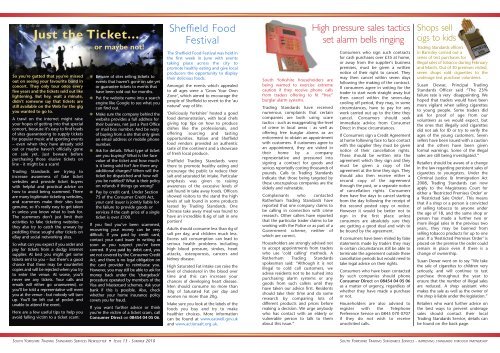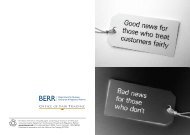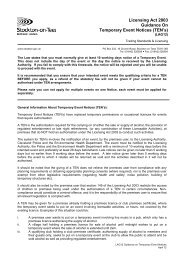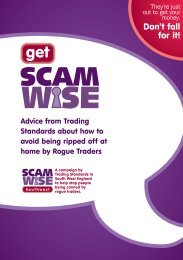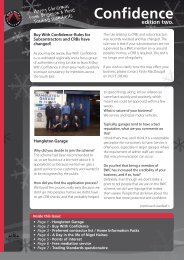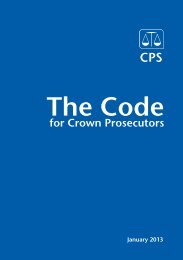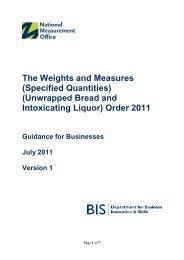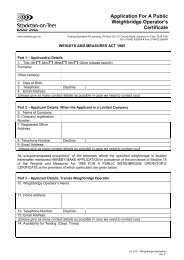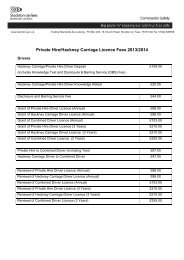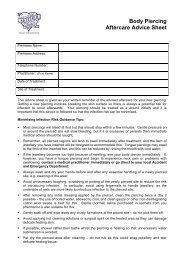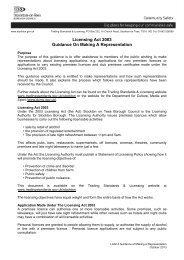Summer 2010 Newsletter - Trading Standards Institute
Summer 2010 Newsletter - Trading Standards Institute
Summer 2010 Newsletter - Trading Standards Institute
You also want an ePaper? Increase the reach of your titles
YUMPU automatically turns print PDFs into web optimized ePapers that Google loves.
Just the Ticket...<br />
or maybe not!<br />
So you’re gutted that you’ve missed<br />
out on seeing your favourite band in<br />
concert. They only tour once every<br />
five years and the tickets sold out like<br />
lightening. But hey, wait a minute,<br />
didn’t someone say that tickets are<br />
still available on the Web for the gig<br />
you wanted to go to.<br />
A trawl on the internet might raise<br />
your hopes of getting into that special<br />
concert, because it’s easy to find loads<br />
of sites guaranteeing to supply tickets<br />
for popular music and sporting events<br />
– even when they have already sold<br />
out or maybe haven’t officially gone<br />
on sale yet. Just beware before<br />
purchasing those elusive tickets on<br />
line - it might be a scam!<br />
<strong>Trading</strong> <strong>Standards</strong> are trying to<br />
increase awareness of fake ticket<br />
websites and provide ticket buyers<br />
with helpful and practical advice on<br />
how to avoid being scammed. There<br />
are many legitimate ticketing websites,<br />
and scammers make their sites look<br />
genuine, so it’s really easy to get taken<br />
in unless you know what to look for.<br />
The scammers don’t just limit their<br />
activities to fake ticketing websites –<br />
they also try to catch the unwary by<br />
peddling those sought after tickets on<br />
eBay and social networking sites.<br />
So what can you expect if you order and<br />
pay for tickets from a dodgy internet<br />
supplier. At best you might get some<br />
tickets sent to you – but there’s a good<br />
chance that these may be counterfeit<br />
copies and will be rejected when you try<br />
to enter the venue. At worse, you’ll<br />
never see any tickets. Your calls and<br />
emails will either go unanswered, or<br />
you’ll be told a representative will meet<br />
you at the venue - but nobody will turn<br />
up. You’ll be left out of pocket and<br />
unable to attend the event.<br />
Here are a few useful tips to help you<br />
avoid falling victim to a ticket scam:<br />
❃ Beware of sites selling tickets to<br />
events that haven’t gone on sale yet<br />
or guarantee tickets to events that<br />
have been sold out for months.<br />
❃ Put the website name into a search<br />
engine like Google to see what you<br />
can find out.<br />
❃ Make sure the company behind the<br />
website provides a full address for<br />
their business, not just a Post Office<br />
or mail box number. And be wary<br />
of buying from a site that only gives<br />
an email address or mobile phone<br />
number.<br />
❃ Ask for details. What type of ticket<br />
are you buying? What is the face<br />
value of the ticket and how much<br />
is it being sold for? Are there any<br />
additional charges? When will the<br />
ticket be dispatched and how will<br />
you be notified? What is their policy<br />
on refunds if things go wrong?<br />
❃ Pay by credit card. Under Section<br />
75 of the Consumer Credit Act,<br />
your card issuer is jointly liable for<br />
the failure to provide goods or<br />
services if the cash price of a single<br />
ticket is over £100.<br />
If you find you’ve been scammed,<br />
recovering your money can be very<br />
difficult. If you paid by credit card,<br />
contact your card issuer in writing as<br />
soon as you suspect you’ve been<br />
conned. If you paid by debit card, you<br />
are not covered by the Consumer Credit<br />
Act, and there is no legal obligation on<br />
the card provider to reimburse you.<br />
However, you may still be able to ask for<br />
money back under the ‘chargeback’<br />
procedure operated by members of the<br />
Visa and Mastercard schemes. Ask your<br />
bank if this is possible. Also, check<br />
whether your home insurance policy<br />
covers you for fraud.<br />
If you want further advice or think<br />
you’re the victim of a ticket scam, call<br />
Consumer Direct on 08454 04 05 06.<br />
Sheffield Food<br />
Festival<br />
The Sheffield Food Festival was held in<br />
the first week in June with events<br />
taking place across the city to<br />
promote healthy eating and give local<br />
producers the opportunity to display<br />
their delicious foods.<br />
Amongst the events which appealed<br />
to all ages were a ‘Grow Your Own<br />
Zone’, which aimed to encourage the<br />
people of Sheffield to revert to the ‘au<br />
natural’ way of life.<br />
‘Deliciously Yorkshire’ hosted a good<br />
food demonstration, with local chefs<br />
giving top tips on how to produce<br />
dishes like the professionals, and<br />
offering sourcing and tasting<br />
opportunities. Italian and Sheffield<br />
food vendors provided an authentic<br />
taste of the continent and a showcase<br />
of fresh local produce.<br />
Sheffield <strong>Trading</strong> <strong>Standards</strong> were<br />
there to promote healthy eating and<br />
encourage the public to reduce their<br />
salt and saturated fat intake. Particular<br />
emphasis was given to raising<br />
awareness of the excessive levels of<br />
salt found in take away foods. Officers<br />
showed visitors to the stand the high<br />
levels of salt found in some products<br />
tested by <strong>Trading</strong> <strong>Standards</strong>. One<br />
Chinese take away meal was found to<br />
have an incredible 8.6g of salt in one<br />
portion!<br />
Adults should consume less than 6g of<br />
salt per day, and children much less.<br />
Excess salt consumption can lead to<br />
serious health problems including<br />
high blood pressure, strokes, heart<br />
attacks, osteoporosis, cancers and<br />
kidney disease.<br />
High Saturated Fat intake can raise the<br />
level of cholesterol in the blood over<br />
time and this can increase your<br />
chances of developing heart disease.<br />
Men should consume no more than<br />
30g of Saturated Fat per day and<br />
women no more than 20g.<br />
Make sure you look at the labels of the<br />
foods you buy and try to make<br />
healthier choices. More information<br />
can be found at www.eatwell.gov.uk<br />
and www.actionsalt.org.uk.<br />
South Yorkshire householders are<br />
being warned to exercise extreme<br />
caution if they receive phone calls<br />
from traders offering to fit “free”<br />
burglar alarm systems.<br />
<strong>Trading</strong> <strong>Standards</strong> have received<br />
numerous complaints that certain<br />
companies are both using scare<br />
tactics - such as exaggerating the level<br />
of crime in local areas - as well as<br />
offering free burglar alarms as an<br />
enticement to obtain an appointment<br />
with customers. If customers agree to<br />
an appointment, they are visited in<br />
their home by a company<br />
representative and pressured into<br />
signing a contract for goods and<br />
sevices reportedly costing thousands of<br />
pounds. Calls to <strong>Trading</strong> <strong>Standards</strong><br />
indicate that those being targeted by<br />
these unscrupulous companies are the<br />
elderly and vulnerable.<br />
Complainants who contacted<br />
Rotherham <strong>Trading</strong> <strong>Standards</strong> have<br />
reported that one company claims to<br />
be calling in connection with crime<br />
research. Other callers have reported<br />
that the particular trader claims to be<br />
working with the Police or as part of a<br />
Government scheme, neither of<br />
which are correct.<br />
Householders are strongly advised not<br />
to accept appointments from traders<br />
who use ‘cold calling’ methods. A<br />
Rotherham <strong>Trading</strong> <strong>Standards</strong><br />
spokesman said: “Although it is not<br />
illegal to cold call customers, we<br />
advise residents not to be rushed into<br />
purchasing alarm systems or any<br />
goods from such callers until they<br />
have taken our advice first. Residents<br />
should take their time and do some<br />
research by comparing lots of<br />
different products and prices before<br />
making a decision. We urge anybody<br />
who has contact with an elderly or<br />
vulnerable person to talk to them<br />
about this issue.”<br />
High pressure sales tactics<br />
set alarm bells ringing<br />
Consumers who sign such contracts<br />
for cash purchases over £35 at home,<br />
or away from the supplier’s business<br />
premises, must be given a written<br />
notice of their right to cancel. They<br />
may then cancel within seven days<br />
following the making of the contract.<br />
If consumers agree in writing for the<br />
trader to start work straight away but<br />
then cancel within the seven-day<br />
cooling off period, they may, in some<br />
circumstances, have to pay for any<br />
work carried out up to the time they<br />
cancel. Consumers should seek<br />
immediate advice from Consumer<br />
Direct in these circumstances.<br />
If Consumers sign a Credit Agreement<br />
at home following face to face contact<br />
with the supplier they must be given<br />
notice of their cancellation rights.<br />
These should be written into the<br />
agreement which they sign and they<br />
must be given a copy of the<br />
agreement at the time they sign. They<br />
should also then receive either a<br />
second copy of the agreement<br />
through the post, or a separate notice<br />
of cancellation rights. Consumers<br />
then have five days to cancel starting<br />
from the day following the receipt of<br />
this second posted copy or notice.<br />
However it would be better not to<br />
sign in the first place unless<br />
consumers are absolutely sure they<br />
are getting a good deal and wish to<br />
be bound by the agreement.<br />
If consumers have been misled by false<br />
statements made by traders they may<br />
in certain circumstances still be able to<br />
terminate the agreement outside these<br />
cancellation periods but would need to<br />
take legal advice on their rights.<br />
Consumers who have been contacted<br />
by such companies should phone<br />
Consumer Direct on 08454 04 05 06<br />
as a matter of urgency, regardless of<br />
whether they have made a purchase<br />
or not.<br />
Householders are also advised to<br />
register with the Telephone<br />
Preference Service on 0845 070 0707<br />
if they do not wish to receive<br />
unsolicited calls.<br />
Shops sell<br />
cigs to kids<br />
<strong>Trading</strong> <strong>Standards</strong> officers<br />
in Barnsley carried out a<br />
series of test purchases for<br />
illegal sales of tobacco during February<br />
and March. Out of 30 premises visited,<br />
seven shops sold cigarettes to the<br />
underage test purchase volunteers.<br />
Susan Dewar, Principal <strong>Trading</strong><br />
<strong>Standards</strong> Officer said “The 23%<br />
failure rate is very disappointing. We<br />
hoped that traders would have been<br />
more vigilant when selling cigarettes<br />
to young people. Some traders did<br />
ask for proof of age from our<br />
volunteers as we would expect, but<br />
the ones that illegally sold cigarettes<br />
did not ask for ID or try to verify the<br />
ages of the young customers. Seven<br />
sellers have been issued with a caution<br />
and the others have been given<br />
formal warnings. Some of the illegal<br />
sales are still being investigated.”<br />
Retailers should be aware of a change<br />
in the law regarding persistent sales of<br />
cigarettes to youngsters. Under the<br />
Criminal Justice & Immigration Act<br />
2008, <strong>Trading</strong> <strong>Standards</strong> can now<br />
apply to the Magistrates Court for<br />
either a ‘Restricted Premises Order’ or<br />
a ‘Restricted Sale Order’. This means<br />
that if a shop or a person is convicted<br />
of selling tobacco to anyone under<br />
the age of 18, and the same shop or<br />
person has made a further two or<br />
more illegal sales in the previous two<br />
years, they may be banned from<br />
selling tobacco products for up to one<br />
year. If a ‘Restricted Premises Order’ is<br />
placed on the premise the order could<br />
remain in place even if there is a<br />
change of ownership.<br />
Susan Dewar went on to say “We take<br />
the sale of cigarettes to children very<br />
seriously, and will continue to test<br />
purchase throughout the year to<br />
ensure that the number of illegal sales<br />
are reduced. A shop assistant who<br />
makes the sale as well as the owner of<br />
the shop is liable under the legislation.”<br />
Retailers who want further advice on<br />
the best ways to prevent underage<br />
sales should contact their local<br />
<strong>Trading</strong> <strong>Standards</strong> Service, details can<br />
be found on the back page.<br />
SOUTH YORKSHIRE TRADING STANDARDS SERVICES NEWSLETTER • ISSUE 13 - SUMMER <strong>2010</strong><br />
SOUTH YORKSHIRE TRADING STANDARDS SERVICES - IMPROVING STANDARDS THROUGH PARTNERSHIP


